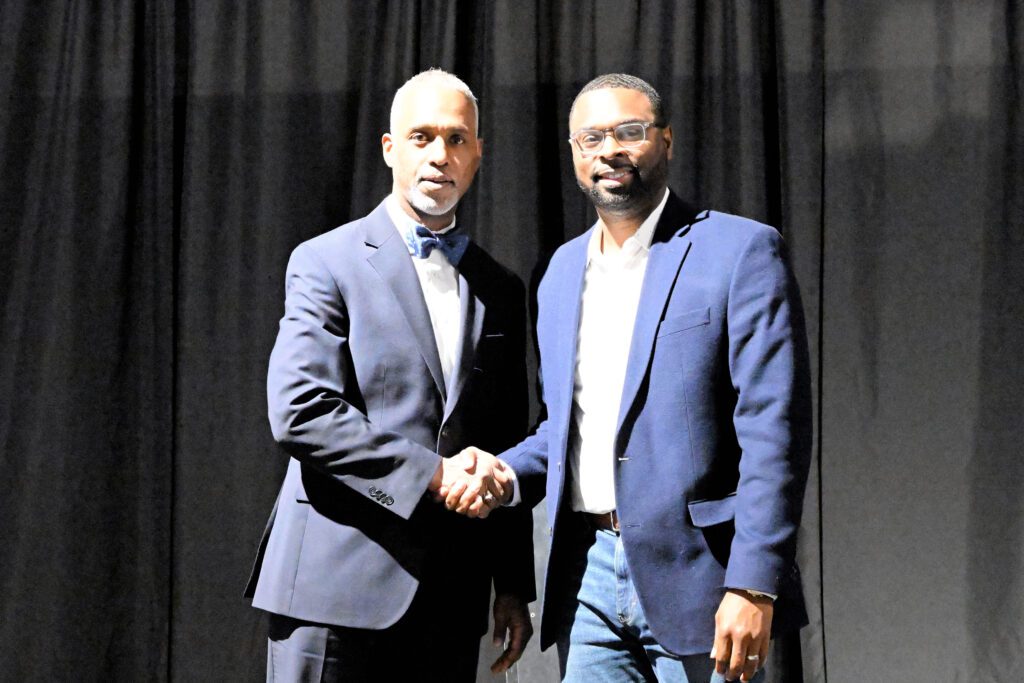
In February, Memphis Mayor Paul Young participated in a Summit on Youth Violence hosted by STEM4US and the Memphis Islamic Center. After his initial remarks, Young participated in a conversation with MIC Director Talib Ibn Karim, which was recorded and posted to Youtube.
The Tri-State Defender accessed a transcript of that conversation, and with the help of artificial intelligence, have edited Young’s 30-minute Q & A session for clarity and length. To view Young’s full remarks for yourself, visit: https://www.youtube.com/watch?v=n1QQPQQiLdQ
Talib Ibn Karim: Mayor Young, amidst this pivotal moment for our community, how do you interpret our situation and proposed response?
Mayor Paul Young: We are indeed in a crisis, at a pivotal moment in our history where the direction we take is critical. The events unfolding in our community, their brazen nature, are deeply troubling. Since my first day in office, I’ve been adamant that tackling this issue requires a unified approach. It’s not just about the immediate actions but understanding the deeper, systemic issues that have led us to this point.
Our young people, faced with dire choices, are making decisions that, while seemingly logical to them given their circumstances, lead down a path of destruction. It is absolutely critical that we, as a community, come together to show them that there are alternatives, that a different, more hopeful path is possible.
Q: With the city in a state of crisis, what strategies do you believe are essential to navigate this turmoil?
Young: Addressing this crisis requires a multi-faceted strategy. First and foremost, we must hold those accountable who seek to terrorize our communities. But beyond accountability, we need a strong focus on intervention and prevention. For too long, our approach has been reactionary, waiting until a point of no return before we take action.
We need to identify at-risk youth early on and engage them in meaningful ways. This involves not just law enforcement but the entire community—schools, churches, community organizations—coming together to provide support and alternatives to those who feel they have none. It’s about changing the narrative and showing our young people that their community is invested in their future and well-being.
Q: In tackling public safety and youth violence, can you outline the specific actions your administration is taking?
Young: Our administration is taking a comprehensive approach to enhance public safety and address youth violence. We’re increasing law enforcement presence in key areas, focusing on data-driven strategies to identify and intervene with the small subset of individuals responsible for the majority of serious crimes. We’re also working to improve communication and coordination among the many organizations doing critical work on the ground.
By creating a unified platform for these efforts, we can ensure that our resources are being used efficiently and effectively. Furthermore, we’re conducting a thorough analysis of gun violence incidents to better understand the networks and dynamics driving this violence. This will enable us to target our interventions more effectively, aiming to disrupt the cycle of violence at its core.
Q: Reflecting on the broader community’s role, especially parents, what’s your vision for enhancing their involvement in this collective effort?
Young: The role of parents and the broader community in this collective effort cannot be overstated. Our vision is to empower parents, guardians, and community members to become proactive participants in shaping a positive future for our youth. This involves providing them with the resources, support, and education needed to effectively guide and mentor their children.
We recognize the challenges many families face, including economic hardships, lack of access to quality education, and limited exposure to positive role models. To address these issues, we are exploring ways to reallocate our budget and resources towards programs that directly benefit our youth and their families. This includes after-school programs, job training initiatives, and community mentoring schemes. By enhancing the support structure available to parents and guardians, we aim to create a more nurturing and conducive environment for our young people to grow, learn, and thrive.
Q: As you envision Memphis’s future, particularly in terms of technology and innovation, what steps are you taking to realize this vision?
Young: Memphis’s future as a hub of technology and innovation is a vision that my administration is deeply committed to realizing. We are actively taking steps to attract tech companies and promote innovation within our city.
This includes leveraging our strategic location and existing strengths, such as our significant logistics and distribution capabilities, as a foundation upon which to build our tech ecosystem. Furthermore, we are focused on nurturing our homegrown talent, particularly among our black and female populations, who represent a largely untapped resource in the tech industry.
By creating partnerships with educational institutions, private sector entities, and community organizations, we aim to develop programs that foster technological skills and innovation among our youth and the broader community. Our goal is not only to attract external investment but also to cultivate an environment where local entrepreneurs and innovators can thrive, driving economic growth and creating high-quality jobs for Memphians.
Q: In closing, what message would you like to impart to the citizens of Memphis and their leaders as we forge ahead?
Young: As we move forward, my message to the citizens of Memphis and their leaders is one of hope, unity, and action. The challenges we face are significant, but they are not insurmountable.
With a collective commitment to our city’s future, we can overcome the obstacles before us. My administration is dedicated to leading these efforts, but we cannot do it alone.
Success requires the active participation and support of every sector of our community. Together, we can build a safer, more prosperous, and more equitable Memphis for all its residents.
I invite everyone to join us in this critical work, to contribute their ideas, their energy, and their resources. Let us unite in our resolve to make a lasting positive impact on our city and its future.




